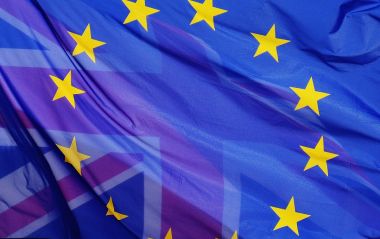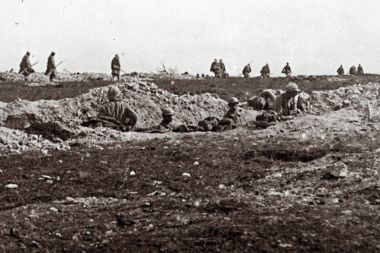Brexit and the myth of progress: Mourning the passing of a 'peaceful' world

Is Brexit the end of the world? No. But to some it feels like it. Those who are upset at the result aren't simply expressing disappointment that their side lost or that a political decision went against them. They're mourning the passing of the world they grew up with.
100 years ago today, men of my age were preparing for battle. Unimaginable horror awaited them. Thousands would be killed the day after. Altogether nearly 150,000 British and Allied lives would be lost in the Battle of the Somme.
As a schoolboy I can remember studying it. Though I was looking at first-hand accounts, pictures and other primary sources, it barely seemed real. How could this have happened? When I was at university, I remember a similar inability to comprehend. I wrote an essay about the Pals Battalions (groups of young men from a town or village who signed up and served together) and the Loyal North Lancashire Regiment. These were lads of my age who'd signed up, been sent to war and many of whom never came home.
With my whole life stretching out ahead of me, I couldn't understand the concept. But this says less about me than it does about the world I grew up in. My world was peaceful, prosperous and progressing, or so I thought.
That world may well have come to an end as a result of the Brexit vote.
I was born in 1982 and have hazy memories of the tumultuous political times of the late 80s. As the Eastern Bloc collapsed and the Berlin Wall came down, we were in uncharted territory. After the end of the first Gulf War, it really did seem for a time that peace and prosperity were on the way, not just for the West, but the rest of the world too.
The horror in the former Yugoslavia, the genocide in Rwanda and continuing blood-letting in Northern Ireland should have tipped us off that this wasn't the case. Yet despite being conscious of this news, horrific as much of it was, those of us living in provincial England were shielded from it all. Even being in Manchester on the day of the massive IRA bomb there didn't shake my naïve feeling of peace and security.
We were growing up in a bubble, the likes of which hadn't been seen for generations. As we grew more aware, things seemed to be getting better and better. The economy was booming and (save for the dot com bubble bursting) would continue to do so until 2007/8.
Those awful conflicts in Rwanda, former Yugoslavia and even Northern Ireland came to an end. Apartheid had ended, and in 1994 Nelson Mandela was elected as President of the new South Africa. He duly donned a Springbok rugby shirt as the rainbow nation won the Rugby World Cup – if reconciliation was possible there then surely it was possible everywhere?
Football hooliganism seemed to abate, Britain was cool again and with the new Millennium round the corner, those of us coming of age in 2000 seemed to have the world at our feet.
Most of that generation wouldn't have been familiar with the work of philosopher Francis Fukuyama. Yet we'd probably have been broadly on board with the argument of his 1992 book, The End Of History And The Last Man which suggested peace and prosperity would dominate the globe after the triumph of liberal democracy and free market capitalism.
This naïve faith in progress towards peace, prosperity and happiness for all was brought crashing down on September 11, 2001. As I watched the second plane crash into the Twin Towers on a bank of TV screens in the large out-of-town electronics shop where I worked, it seemed that the relatively peaceful and stable last decade of the 20th century was truly over.
Soon enough, a series of events would confirm it. The catastrophic decision of the USA and the UK to invade Iraq in 2003 against military, political and ethical advice (not to mention vast public demonstrations) lit a fire in the Middle East, which burns with increasing intensity. Syria, Iraq and Libya are in chaos. Turkey looks increasingly fragile. Israel and Palestine is an urgent question to be resolved. Amid this scene of devastation, the refugee and migrant crisis has arrived in Europe.
In 2007/8, the shortcomings of the capitalist system were made abundantly clear as many millions around the world lost their jobs because of arcane financial transactions carried out by a few men in the City of London and on Wall Street. The cycle of austerity and flatlining wages which have followed were another nail in the coffin of a belief that everything was getting better.
It may be that the final nail in that coffin was hammered in by last week's vote for the UK to leave the EU. No longer can any of us pretend that all is well with the world or even in our own country. Regardless of whether we favoured remaining or leaving the EU, the vote has exposed the bitter divide that runs through British society – an educated metropolitan class which is separated almost completely from a provincial working class. The country is riven by Brexit but it's more profound than that. We are a deeply divided society.
The world as we knew it is over and no one know what the new one looks like. In the well-worn words of Italian political theorist Antonio Gramsci, "The crisis consists precisely in the fact that the old is dying and the new cannot be born." Our uncertain future not only spooks the financial markets – it puts doubt into our minds. If we can't rely on the peace and prosperity of our youth, what can we rely on?
Only now do we see that we were the first generation in 100 years to experience this peace and prosperity and lack of worry. Our parents dealt with the existential threat of the Cold War. Our grandparents lived and died through the horrors of fascism and the Second World War. Their parents lived through the horrors of nationalism and the First World War.
Ironically, it was the Battle of the Somme itself which is said to have finally exploded the myth of continuous peace and prosperity in the Edwardian age. "Never such innocence, Never before or since," as Phillip Larkin wrote, "Never such innocence again."

In a very different way to the Somme, Brexit may be the point at which many of us realised that the old order has passed away. As John Gray has argued, "European institutions have preserved the peace for more than a generation and presided over a steady growth in prosperity. The very idea that they could now break up challenges the prevailing belief in steady improvement, which is the faith of practical men and women who imagine they have no religion."
Gray highlights that a belief in progress towards a peaceful nirvana is a faith position. As Christians though our faith tells us something different. The Christian story tells us that the idea of advancing peace, prosperity and progress is a myth. Instead it offers us a vision of an advancing Kingdom. The Kingdom will bring peace, but it doesn't come about in a progressive, cumulative way.
Jesus tells us to expect, "wars and rumours of wars." His view is far more realistic than Fukuyama's, or indeed that with which I grew up. Instead of a progressive transition towards utopia, there will be difficulties and times of extreme turbulence. In spite of this, the Kingdom advances in unexpected ways – and it's those we should watch out for, and join in with.
Brexit might feel like the end of the world and in many ways it is the end of the world some of us grew up with. Yes, it feels disorienting and confusing to some. Yes we are in a deep crisis, but our young men are not about to march off to their deaths in their thousands. We should be very, very thankful for that, and for the relative peace and prosperity that we still do enjoy.
Follow Andy Walton on Twitter: @waltonandy











